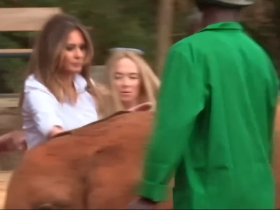Ex-poacher turned fierce wildlife defender
By Evelyn Makena for People Daily in Kenya
“It was downright risky,” recalls Kapuna Lepale, a nomadic herder from Kenya’s Samburu people, who turned to poaching before reforming and transitioning into a dedicated wildlife tracker and protector at a wildlife conservancy.
For eight years, Kapuna crept through the thorny bushes and vast savannah of protected areas in Samburu armed with just a bow and arrow, which he used to bring down elephants.
He retreated into the treacherous landscape with thorns, foliage and dangerous animals for days, and patiently waited for the opportune time to execute his plan.
But as he brought down elephant after elephant before speedily getting their tusks and selling them to a middleman, his life turned into a restless existence.
“When I started, I would sell a kilogramme of the tusks at GBP1. On average, a tusk weighed nine kilos. Due to the high risk of evading authorities we later renegotiated the prices to GBP2 per kilo. I was a man on the run,” he says.
Read more
Melania Trump caught by surprise as baby elephant charges at her
According to Space for Giants, a Kenyan-based conservation charity, North Central Kenya region is home to the second largest population of the African elephant in Kenya.
Across Africa, International Union for Conservation of Nature estimates that elephants have declined by 108,000 in the past 10 years largely due to poaching.
In Oldonyo Uasin, Samburu county where Kapuna was born, wildlife roamed in the village freely. Occasionally, he would hunt buffalos, gazelles and giraffes for food.
Then he met a friend from Marsabit in northern Kenya who introduced him to elephant poaching.
“He told me that I could make money by killing elephants, getting their tusks and teeth and selling to him,” says Kapuna. He then got into the wildlife habitat killing animals for money and soon he was hooked.
But Kapuna’s biggest headache was evading the authorities, who tracked him relentlessly and at some point forcing him to hide in the bushes.
His turnaround came in 2001 when elders in his community summoned him and threatened to curse him if he did not stop poaching. He quit, but instead of retreating back home, the elders encouraged him to apply his tracking skills and mastery of animal behaviour to help conserve wildlife in the area.
The work that Kapuna did as a poacher is at the very bottom of the poaching organised crime syndicate.
From the poachers, the ivory is sold to local middlemen, before it goes through transporters who then pass it to the urban middleman and finally ends up in the hands of the kingpin or a powerful criminal businessman, who is at the top level of the criminal chain.
According to the British government, which recently held the London Conference on the Illegal Wildlife Trade, the trade is valued at GBP17 billion a year and is the fourth most lucrative transnational trade after drugs, weapons and human trafficking.
Later in 2001 Kapuna joined Lewa Wildlife Conservancy where he first worked as a lion tracker before embarking on protecting the environment from destruction by humans.
Working as a community conservation champion and a lead tracker at Lewa, he dedicates his time on curbing destructive activities to the environment such as illegal logging and poaching and inspiring change of behaviour for other poachers.
Owing to his dedicated service in protecting wildlife, Kapuna was among 50 rangers from across Africa that were honoured by Paradise Foundation International, a Chinese environmental organisation founded by Alibaba founder, Jack Ma this year.
“Elephant poaching in Kenya reached a high in 2012 and since then has been on a sustained downward trajectory to the point where, compared to some of our fellow countries with elephants, we can say we really don’t have a major problem with elephant poaching,” says Katto Wambua, Senior Criminal Justice Advisor at Space for Giants.
This article is reproduced here as part of the Giants Club African Conservation Journalism Fellowships, a programme of the charity Space for Giants and supported by the owner of ESI Media, which includes independent.co.uk. It aims to expand the reach of conservation and environmental journalism in Africa, and bring more African voices into the international conservation debate. Read the original story here.

